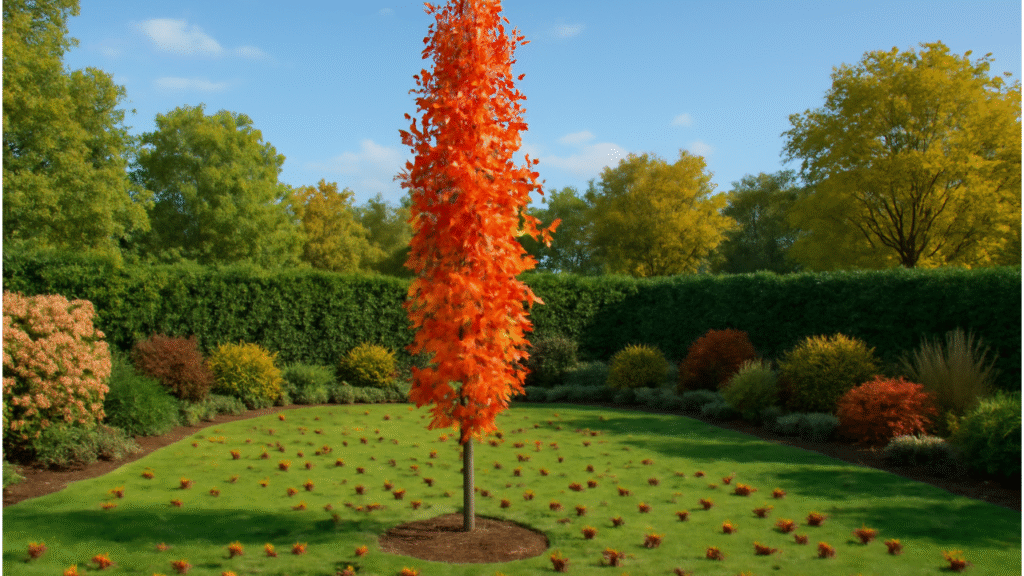
When Do Sweetgum Trees Drop Their Balls? A Complete Guide to Understanding Timing and Maintenance
If you’ve ever found your yard covered in the spiky, golf ball-sized fruits of a sweetgum tree, you’re probably wondering: When do sweetgum trees drop their balls? 🌳🤔 Whether you’re a homeowner trying to keep your garden tidy or someone curious about tree care, understanding the timing of this annual event is essential for effective maintenance.
Sweetgum trees are beautiful and provide ample shade, but their ball-shaped seed pods can create quite a mess when they fall. The problem isn’t just the cleanup—it’s about knowing when to prepare and how to minimize the impact.
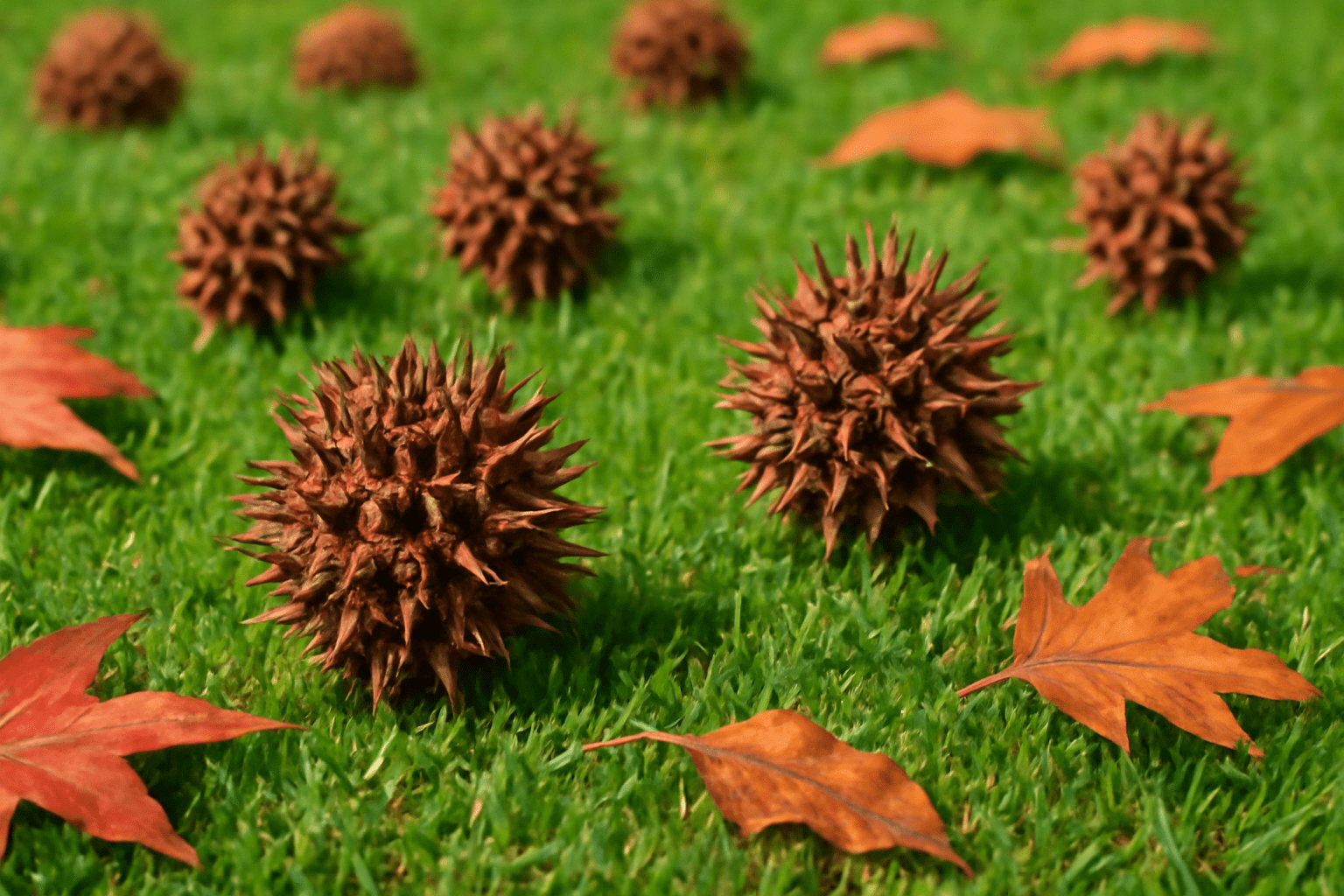
In this guide, we’ll answer all your burning questions about sweetgum ball drops, from timing to tree maintenance, so you can take control of the situation. Keep reading to discover practical tips that will make managing sweetgum trees easier and your yard more enjoyable! 🌿
Table of Contents
Toggle🌳 What Are Sweetgum Balls? 🍂
If you’ve spotted spiky, round seed pods scattered across your lawn, you’ve probably encountered sweetgum balls! But what exactly are they, and why do they seem to take over your yard each fall? Let’s break it down! 🍁

🌰 Sweetgum Balls Explained 🌰
Sweetgum balls are the seed pods produced by sweetgum trees (Liquidambar styraciflua). These small, spiky spheres serve as the tree’s way of dispersing seeds for reproduction. Inside each ball are tiny seeds 🌱 that are released when the pods break apart. The sharp spines covering these balls are nature’s way of protecting the seeds, ensuring they’re not easily eaten by animals 🐿️.
🍃 The Look and Feel of Sweetgum Balls 🍃
These balls can range in size, typically about 1 to 2 inches in diameter, and are covered in sharp, spiky protrusions. While they might seem like a fun natural ornament, these spiky balls are infamous for creating a mess when they fall off the tree 🍂—often covering large areas around the base of the tree 🌳.
🌱 Why Do Sweetgum Trees Produce These Balls? 🌱
Like many other trees, sweetgum trees produce these pods as part of their reproductive process 🌱. The balls are essential for spreading seeds to ensure new trees grow 🌳. While this may be beneficial to the tree species, it can be a headache for homeowners 🏡 when it’s cleanup time.
In the wild, animals like squirrels 🐿️ or birds 🦜 might help with spreading the seeds by carrying them away, but in urban or suburban areas, these balls often stay put—leading to the mess you’re familiar with 😅.
💥 Are Sweetgum Balls Dangerous? 💥
While sweetgum balls are not inherently harmful, their spiky surface can be uncomfortable to step on 👣. This can pose a risk for kids 👶, pets 🐕, or anyone walking barefoot in the yard. Additionally, their dense coverage can make it difficult to mow the lawn 🚜 or maintain a clean yard, which is why many homeowners opt for regular cleanup 🧹.
Now that we know what sweetgum balls are, it’s time to dive into understanding when these little spikes start falling 🍂 and how you can manage them effectively. Keep reading to find out when the drop happens and what you can do to minimize the mess! 🍃🌳
🍂🌳 When Do Sweetgum Trees Drop Their Balls? 🌳🍂
Understanding when sweetgum trees drop their balls can save you from an unexpected yard mess. Whether you’re preparing for autumn 🍁 or just curious, knowing the timing of this natural event will help you manage the cleanup more effectively. Let’s dive into the key details!

🌿🍃 Timing of Sweetgum Ball Drops 🍃🌿
Sweetgum trees typically drop their spiky balls from late fall to early winter, usually between October and December. This is when the seed pods mature and are ready to disperse their seeds 🌱. It’s an annual event that homeowners can expect, but slight variations may occur depending on environmental factors 🌤️.
🍃🌱 How Long Do They Stay on the Tree? 🌱🍃
Sweetgum balls start forming in spring 🌸 when the tree blooms. By early fall 🍂, the balls are fully developed, but they don’t drop immediately. They stay attached to the tree until they’re ready to release their seeds. Depending on weather conditions ☀️🌧️ and tree health, the sweetgum balls can stay on the tree until late fall or even early winter before finally dropping.
☀️🌧️ Weather and Environmental Influence 🌧️☀️
Weather plays a huge role in when sweetgum balls fall. Here’s how different conditions affect the timing:
- Temperature: Cooler temperatures ❄️ in early winter can speed up the ball drop, while warmer weather 🌞 might delay it.
- Excess Rain: Heavy rain 🌧️ can weigh down the balls, making them drop sooner.
- Drought: Dry weather 🌵 can cause early drops, as the tree may shed its pods to conserve water.
Each year’s weather will influence the exact timing, so keep an eye 👀 on your sweetgum tree in the fall to prepare for when the drop occurs. By understanding these factors, you’ll be better equipped to handle the seasonal cleanup!
Now that you know when the sweetgum balls fall, let’s look at what happens next: the mess! In the next section, we’ll discuss what to expect when the balls start dropping and how to deal with the aftermath 🍂🌳.
🍂🌿 What to Expect During the Sweetgum Ball Drop 🌿🍂
When sweetgum balls start falling, it’s easy to feel overwhelmed by the mess they create. But knowing what to expect can help you prepare and manage the situation more efficiently. Let’s break down what happens during the sweetgum ball drop and how you can handle the aftermath like a pro!

😬🍃 The Messy Aftermath 🍃😬
One of the first things you’ll notice when sweetgum balls start dropping is just how many there are! These spiky seed pods can quickly cover large areas of your yard, driveway, or sidewalk. A single tree can produce hundreds of these balls, leading to a thick carpet of spiky pods that can be a tripping hazard.
- Lawn and Garden: Your lawn may become scattered with these sharp balls, which can damage grass or hinder growth if left unchecked.
- Sidewalks and Driveways: If the balls accumulate on hard surfaces, they can create a slippery mess, making it difficult to walk safely or drive over them.
🏠🍂 Common Problems for Homeowners 🍂🏠
- Slippery Surfaces: Sweetgum balls can make your walkways and driveways dangerously slick, especially after rain. This is a major concern for families with kids 👶 or elderly members 👵.
- Mowing Difficulties: If left to accumulate, sweetgum balls can be a nightmare for lawnmowers, potentially damaging the equipment 🚜 or causing inefficient mowing.
- The Hidden Threat: Their spiky surface can puncture soft materials like garden furniture covers 🛋️ or even damage your shoes 👟 if you step on them barefoot!
🧹🍃 Dealing with the Cleanup 🍃🧹
While the drop of sweetgum balls can feel like a nuisance, there are practical ways to manage the cleanup:
- Use a Rake or Leaf Blower: You’ll need a good rake or a leaf blower 🍂 to gather up the balls, especially if you have a large yard. This is usually the easiest method for clearing them off the grass and hard surfaces.
- Lawnmower with a Bag: If the balls have started breaking up, you can use a lawnmower with a bag attachment to collect them as you mow 🚜.
- Composting or Crafting: If you’re into DIY or gardening 🌱, sweetgum balls can be used for composting or as natural decorations for crafts 🎨!
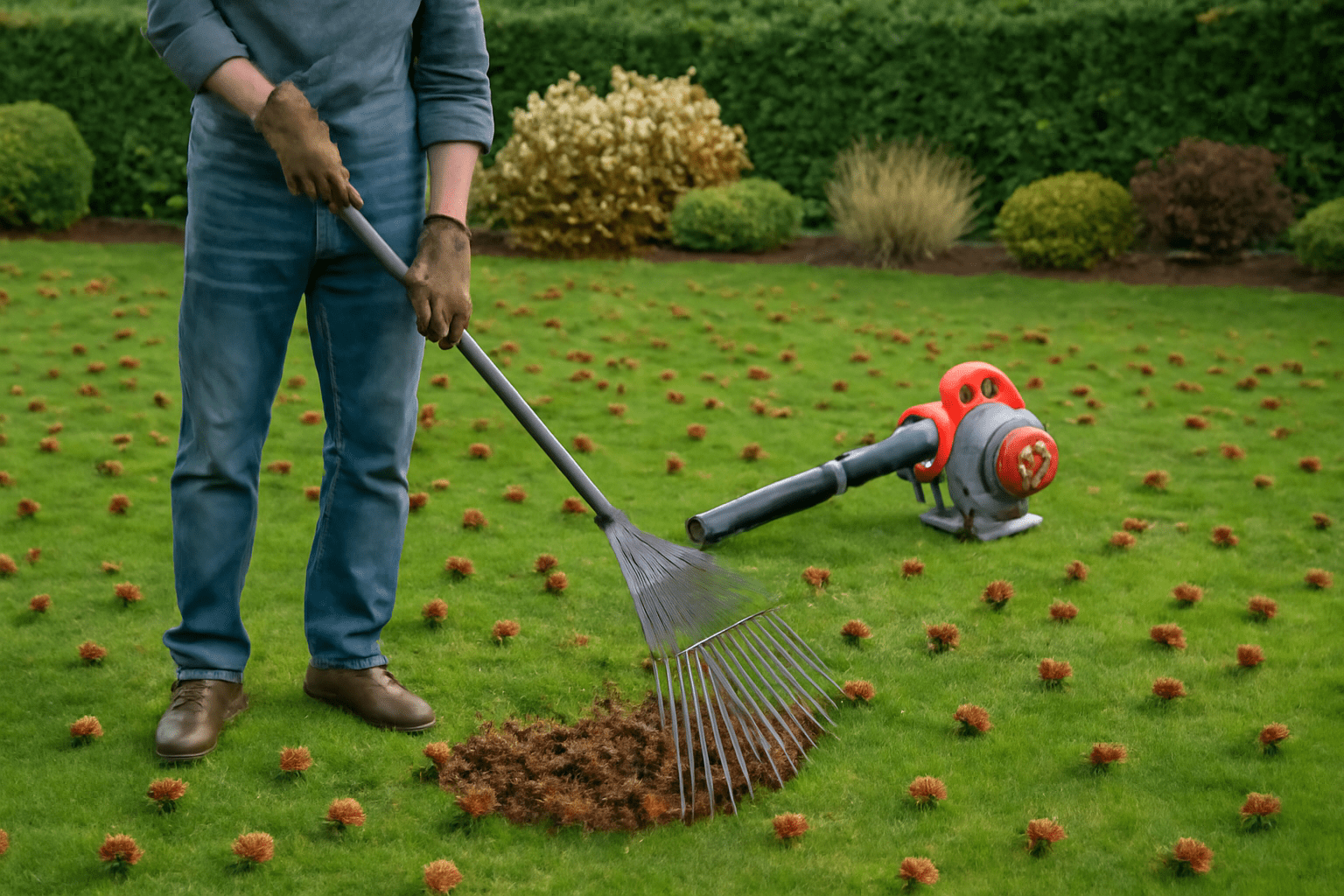
The drop of sweetgum balls doesn’t have to be a stressful event. With some preparation and the right tools, you can handle the mess with minimal effort!
In the next section, we’ll dive into how to maintain your sweetgum tree to reduce the ball drop and make the cleanup process easier. Stay tuned for tips on keeping your tree healthy and manageable! 🌱🍂
🌿🌳 How to Maintain Sweetgum Trees and Minimize the Drop 🌳🌿
While you can’t stop sweetgum trees from producing their spiky seed balls, proper tree care can help reduce the number of balls that fall and make the cleanup process more manageable. Let’s explore practical maintenance tips to keep your sweetgum tree healthy and minimize the mess it creates! 🌳🍂
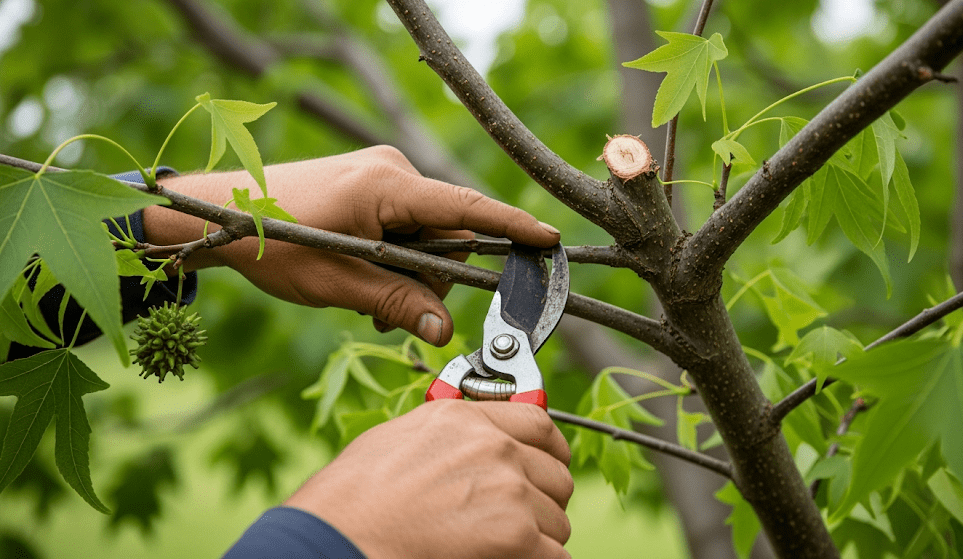
✂️🌱 1. Pruning for a Healthier Tree 🌱✂️
Regular pruning is one of the best ways to maintain your sweetgum tree and potentially reduce the number of seed balls it produces. 🌿
- Timing: The best time to prune your sweetgum tree is in late winter or early spring before the tree begins to produce new growth 🌱.
- How to Prune: Focus on removing any dead, diseased, or damaged branches 🌿. Cutting back overcrowded branches also promotes healthy growth and improves air circulation 💨, which can support the tree’s overall health.
- Impact on Ball Production: Pruning helps reduce the tree’s stress 🧘♂️, which may result in fewer seed balls being produced. While this won’t stop the drop entirely, it can make a difference over time!
🌱🍂 2. Fertilization and Soil Health 🍂🌱
Healthy soil and proper fertilization can significantly improve your sweetgum tree’s health, which might influence how many seed balls it produces. 🌱
- Fertilizing: Use a slow-release, balanced fertilizer in the spring 🌸. This will ensure that your tree gets the nutrients it needs to thrive 🌿 without producing excessive seed pods.
- Soil Health: Ensure the soil around your sweetgum tree is well-draining 🌱 and not compacted 🏞️. Aerating the soil every few years can improve root health and overall tree function, potentially reducing the number of balls produced. 🌳
🌿🍂 3. Mulching Around the Base 🍂🌿
Mulching is a simple yet effective way to care for your sweetgum tree and manage the fallen balls 🍂.
- Benefits: Mulch helps retain soil moisture 💧, suppress weeds 🌿, and maintain consistent soil temperature 🌡️. It can also soften the impact when balls fall 🍃, making them easier to gather later.
- How to Mulch: Spread a layer of organic mulch (like wood chips or bark 🌳) around the base of the tree, keeping it about 6–12 inches from the trunk to avoid rot ⚠️.
💧🌿 4. Watering Practices 🌿💧
Proper watering is key to ensuring your sweetgum tree grows healthy 🌱 and strong 💪, which can help reduce stress and ball production.
- Regular Watering: Water your tree deeply 🌊 during dry spells, especially in the summer 🌞. However, be careful not to overwater 💧, as this can cause root rot 🌱.
- Irrigation Systems: If you’re using an irrigation system 🚰, ensure that it delivers water directly to the roots, not on the tree’s foliage 🍃, to avoid encouraging fungal diseases that could affect ball production. 🍂
🌞🍃 5. Keep the Tree Stress-Free 🍃🌞
Stress from factors like poor weather 🌧️, pests 🐜, or diseases 🦠 can affect the overall health of your sweetgum tree, leading to an increase in seed ball production.
- Protect from Pests: Regularly check your tree for pests like aphids 🐞 or scale insects 🐜, which can weaken the tree. Treat infestations promptly with organic insecticides if needed 🌱.
- Monitor Tree Health: Keep an eye on the general health of the tree 👀. Yellowing leaves 🍂, early ball drops 🍃, or stunted growth 🌱 may indicate underlying issues that need attention. ⚠️
By following these simple yet effective maintenance tips 🌳, you can ensure your sweetgum tree stays healthy and minimizes the mess of falling seed balls 🍂. While you won’t eliminate the problem entirely, proper care can certainly help reduce the hassle of cleaning up! 🌱💚
🌳🍂 Should You Remove Sweetgum Trees? The Pros and Cons 🍂🌳
When faced with the challenge of dealing with falling sweetgum balls year after year, you may find yourself wondering: Should I remove my sweetgum tree? Before making a decision, it’s important to weigh the pros and cons of keeping or removing the tree. Let’s explore the benefits and drawbacks of both options, so you can make an informed choice.
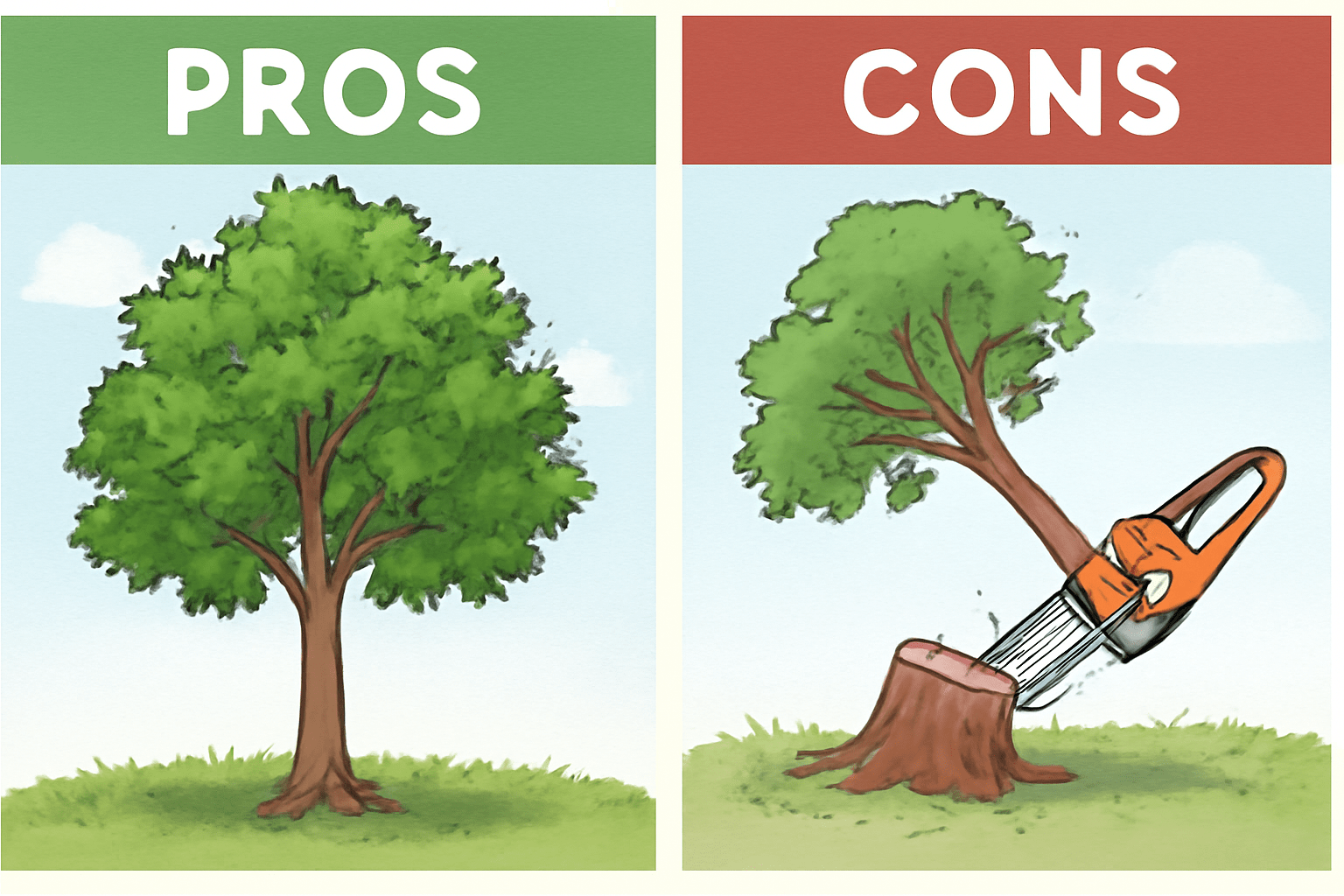
🌱🌸 Pros of Keeping Sweetgum Trees 🌸🌱
- Aesthetic Appeal:
Sweetgum trees are stunning throughout the year 🌸. Their star-shaped leaves turn vibrant red, yellow, and purple in the fall 🍁, offering a beautiful display of color. During the summer ☀️, the tree provides ample shade, which can help cool your home and reduce energy bills 💡. - Wildlife Benefits:
The sweetgum tree is a great habitat for wildlife 🦜. Birds, squirrels 🐿️, and insects 🐝 often feed on the seeds and shelter in the tree’s branches 🌳. By keeping your tree, you’re helping to support local ecosystems 🌍 and providing a home for various creatures. - Environmental Value:
Sweetgum trees are known for their air-purifying properties 🌱, helping to absorb carbon dioxide and produce oxygen 🌍. Keeping the tree on your property can contribute positively to your environment 💚. - Unique Character:
No two sweetgum trees are exactly alike 🌳. Their interesting shape and vibrant colors can add unique character to your landscape 🌷. If you’re a lover of nature 🌿 and appreciate diverse flora, this tree may be a great addition to your yard.
🍂⚠️ Cons of Keeping Sweetgum Trees ⚠️🍂
- Messy Ball Drop:
The most obvious downside of having a sweetgum tree is the annual drop of its spiky seed balls 🍃. These pods can quickly cover your yard, driveway 🚗, and walkways 🚶♂️, creating a safety hazard and a significant cleanup chore 🧹. - Tripping Hazard:
Sweetgum balls are notorious for being sharp and uncomfortable to step on 👣. For children 👶, pets 🐕, or anyone walking barefoot, stepping on these spiky pods can be painful. If you have elderly family members 👵 or anyone prone to falling, this could be a real concern. - Lawn and Garden Damage:
The accumulation of sweetgum balls on your lawn can smother grass 🌱 and other plants 🌸, affecting their growth. Additionally, mowing over these balls can damage your lawnmower 🚜, leading to more maintenance and repair costs 💸. - Tree Maintenance:
Sweetgum trees require regular maintenance ✂️, including pruning and health checks 🏥, to keep them healthy and manageable. If you’re not prepared for this ongoing effort, it could become more of a hassle than a benefit.
🪓🍃 Pros of Removing Sweetgum Trees 🍃🪓
- Eliminate the Mess:
By removing the tree, you’ll no longer have to deal with the annual sweetgum ball drop 🍂. No more cleaning up the sharp, spiky balls every fall 🍁—making your yard easier to maintain and more enjoyable 🌞. - More Space for Other Plants:
Sweetgum trees can grow quite large 🌳, casting a lot of shade ☀️. Removing the tree opens up space for other plants 🌷 or trees 🌳 that may be better suited to your garden’s aesthetic or functional needs. - Reduced Safety Hazards:
Without the sweetgum balls, there’s less risk of tripping or slipping on your lawn 🌿 or walkways 🚶♂️. This is especially important if you have children 👶 or elderly people 👵 in your household.
🌳💰 Cons of Removing Sweetgum Trees 💰🌳
- Loss of Shade and Beauty:
Sweetgum trees provide much-needed shade in the summer 🌞, making your yard more comfortable and reducing energy costs 💡. Their vibrant fall colors 🍂 also offer a visual treat, which you’ll lose if the tree is removed. - Cost of Removal:
Removing a large sweetgum tree 🪓 can be expensive 💸, especially if it’s near structures or other trees 🌳. You’ll also need to factor in the cost of stump grinding 🛠️ to prevent regrowth. This can add up quickly, making removal a costly option. - Environmental Impact:
Removing a tree 🌳 can disrupt local wildlife habitats 🐦 and reduce the overall greenery 🌱 in your area. If you care about the environment 🌍, this could be a downside to consider.
🍃 Making the Right Decision for Your Yard 🍃
The decision to keep or remove your sweetgum tree depends on your personal preferences, the amount of effort you’re willing to put into maintenance 🧹, and how much the tree’s benefits 🌳 outweigh its drawbacks. If you love the shade 🌞, beauty 🌸, and wildlife support 🦜 it provides, keeping the tree might be the best choice. However, if the mess 🍂 and safety hazards ⚠️ are more trouble than they’re worth, removal could be the right option.
🌳🍂 Final Thoughts 🍂🌳
Sweetgum trees are a beautiful addition to many landscapes, offering shade 🌞, vibrant fall colors 🍁, and wildlife benefits 🦜. However, their spiky seed balls can be a real challenge when it comes to yard maintenance 🧹. By understanding when sweetgum trees drop their balls 🍃 and taking steps to properly care for the tree, you can minimize the mess and enjoy all the benefits these trees offer without the hassle.

Whether you choose to keep your sweetgum tree 🌳 or decide to remove it entirely 🪓, it’s important to consider both the pros and cons ⚖️, weigh your yard’s needs 🌻, and find the solution that works best for you. Remember, regular pruning ✂️, fertilization 🌱, and proper tree care 🧑🌾 can go a long way in reducing the number of fallen seed pods 🍂 and maintaining a healthy, beautiful tree 🌳.
No matter your decision, understanding the sweetgum tree’s life cycle 🌱 and how to manage its impact can help you maintain a cleaner, safer, and more enjoyable yard 🏡. 🌱🍃
Happy tree care! 🌳✨
Frequently Asked Questions (FAQs)
When do sweetgum trees drop their balls?
Sweetgum trees typically drop their spiky seed balls in late fall to early winter, between October and December. The exact timing can vary based on climate, weather, and the health of the tree.
How long do sweetgum balls stay on the tree?
Sweetgum balls generally remain on the tree from spring until they fall in late fall or early winter. Once fully matured, they naturally detach to disperse their seeds.
Why do sweetgum trees produce so many balls?
Sweetgum trees produce large quantities of seed balls as part of their reproductive process. These balls contain seeds that are released to help the tree reproduce and grow new trees.
Can I prevent sweetgum balls from falling?
While you can’t stop sweetgum trees from producing seed balls, proper pruning and tree care can reduce the number of balls produced each year. Keeping the tree healthy and stress-free may help minimize the mess.
Are sweetgum balls dangerous?
Sweetgum balls can be sharp and uncomfortable to step on, posing a risk to children, pets, or anyone walking barefoot. It’s important to clear them from walkways and lawns to avoid accidents.
How can I clean up sweetgum balls efficiently?
You can clean up sweetgum balls using a leaf blower, rake, or a lawnmower with a bag attachment. For large areas, consider using a lawn vacuum or a push broom for easier collection.
Should I remove my sweetgum tree?
Removing your sweetgum tree depends on your personal preferences. If the mess from fallen seed balls is too much to handle, you might consider removal. However, sweetgum trees provide shade, beauty, and wildlife benefits, so carefully weigh the pros and cons before making a decision.
How can I reduce the number of sweetgum balls that fall each year?
Regular pruning, proper watering, and using mulch around the tree can help keep the sweetgum tree healthy and potentially reduce the number of balls it produces. Avoid over-fertilizing, as this can lead to more seed production.
